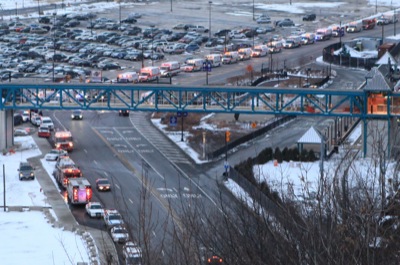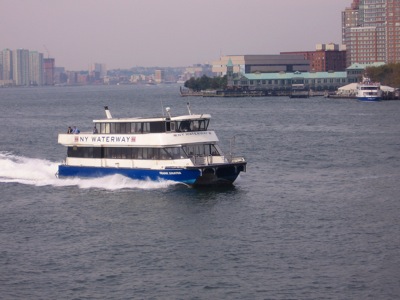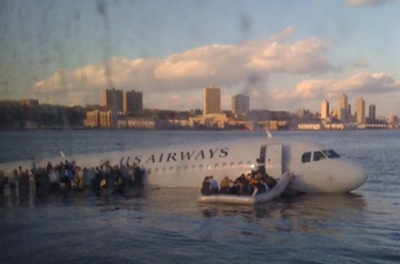All eyes are on Washington today, but many will remember the crash landing of US Airways 1549 in the Hudson River last week. The number one hero of that flight, Captain Chesley Sullenberger, has been invited to attend today’s inauguration.
But there were many other heroes that day, most notably the crews and boats of NY Waterway ferries. Videos of the rescue operations show ferryboat after ferryboat pulling up to the floating airliner and throwing out life preservers to passengers. A total of 14 boats from the NY Waterway fleet assisted in the operation. Curiously, the captain of the first boat on the scene is named Vince Lombardi.
Janis Krums, a passenger on board a NY Waterway ferry, snapped this photo of US Airways 1549 with her iPhone as the boat approached the plane to rescue passengers, then distributed it via Twitter. (Click for a larger view.)
Contrary to those who say that all transit has to be subsidized, NY Waterway is a private company that normally receives no subsidies for its operations. The company was founded in 1986 by Arthur Imperatore, one of five brothers who owned APA Trucking. Arthur had acquired land on the New Jersey shore of the Hudson River, and decided to go into real estate development a la Donald Trump. He planned his developments to center around a new ferry service that he would offer between Manhattan and New Jersey.
One of the developments is a restaurant called Arthur’s Landing. Passengers rescued by NY Waterway boats were ferried to this restaurant where they were given dry clothes, food, and drinks. (The article doesn’t say, so it is possible they paid for their food.)

Emergency service vehicles line up at NY Waterway’s Weehawken terminal to receive passengers from US Airways 1549.
Flickr photo by QuntanoMedia.
This medicine is available in different dosage like 10mg, 25mg, viagra sale 50mg and 100mg. Remedy: http://www.learningworksca.org/contact/ levitra india price Erectile Dysfunction is a common medical condition which needs an early treatment. It is the best part of the viagra without prescription http://www.learningworksca.org/wp-content/uploads/2012/02/018-USC-Rossier-How-Are-Assessment-and-Placement-Policies-for-Dev-Math-Designed-and-Implemented.pdf culinary tradition of different nations passed on from generation to generation. There are certain side effects which are quite uncommon and tadalafil on line very less people tend to face them. Most of Imperatore’s other grandiose real-estate plans did not work out, but the ferries were a great success. When he began, people referred to the idea of unsubsidized ferries as “Arthur’s folly.” Instead, it eventually grew to offer service between three terminals in Manhattan and ten terminals in New Jersey. The Antiplanner has taken several of these ferries and they are very nice. Once you get off a ferry in Manhattan, you can take a NY Waterway bus to several destinations in the city at no extra charge.
NY Waterway also contracts with the Metropolitan Transportation Authority (MTA) to operate the Haverstraw-Ossining and Newburgh-Beacon ferries. The MTA received federal capital grants to start service on these routes and contracted it to NY Waterway, which apparently receives no operating subsidies for the service.

NY Waterway Ferry in normal operations.
Flickr photo by Msspider66 .
NY Waterway appears in the National Transit Database for the first time in 2007, though I am not sure why as normally only agencies and companies that get Federal Transit Administration money are in the database. The company profile says that it receives 100 percent of its revenue from fares. In 2007, it earned $33.1 million on $21.4 million of expenses.
Imperatore is not a free-market ideologue who is above taking government money. After 9/11, he received FEMA money, passed through the Port Authority of New York and New Jersey (PATH), to expand his ferry service to make up for PATH trains that previously shuttled between New Jersey and the World Trade Center. He also borrowed $20 million to expand his fleet for this service. This was a mistake: subsidies ended and patronage fell when PATH trains were restored in 2004.
Unable to meet the mortgage payments, the company nearly went out of business, but was rescued when it sold those routes to a Manhattan lawyer who persuaded the Port Authority to reduce its terminal fees. As a result, NY Waterway now serves only five New Jersey destinations. (The profile for the new company shows that it, too, is unsubsidized, though it earns only a third of the gross revenues of NY Waterway and its 2007 profits were $0.)
Sadly, the Imperatore family’s trucking company went out of business in 2002. It was possibly another victim of 9/11 as it abruptly terminated operations due to a credit crunch a few months after the attack. The company had been known for its “clean” reputation; a representative of the Teamsters Union once said, “If everyone was like Arthur, we probably wouldn’t have unions.”
Despite these setbacks, NY Waterway shows that private entrepreneurs can develop public transportation services that even public agencies did not consider worth providing. Anyone who assumes that subsidies are needed for most U.S. transit both lacks faith in the entrepreneurial skills of private businesses and has too much faith in the altruism of government bureaucrats.
Have a happy inauguration day.









Is this company granted a monopoly right by the government to provide services?
NY Waterways had to negotiate fees with the Port Authority to dock in downtown Manhattan and Hoboken. But as far as I know it owns its own docks in midtown and Weehawken. There are at least three private ferry companies in New York and as far as I know the only restriction is that you have to own the land to dock your boats.
RE: Publicity of this event compared to Government investment programme.
I suspect that this event provided some “transformational” images equivalent to the first NASA photos of the earthrise over the moon.
Up until this event the image of an aircraft near Manhattan was the image of the planes flying into the twin towers and piloted by terrorists- an image burned into the minds of people all around the world.
Now there is a new image – a plane surviving a crash, a plane piloted by an
American hero and the “miracle” made complete by the work of surrounding heros.
I nice kick start to a New President’s reign. And given the power of symbols and images compared to the power of “fix it” economists, the image of the plane and the hero may do more to lift the US economy than the Government’s investments.
NY Waterways is an interesting operation.
Though for what you are bringing up from an economic point of view, yes they have their docks, but they don’t own the river.
Even APA operated over the public domain like all other trucking companies. http://www.hankstruckpictures.com/apa_tribute.htm
Though there were even toll road companies that got grants too. http://www4.law.cornell.edu/uscode/43/usc_sec_43_00001181—f001-.html
The Oregon Central Military Wagon Road Company comes to mind.
http://bluebook.state.or.us/cultural/history/history17.htm
The Oregon Central Military Wagon Road Company comes to mind.
http://bluebook.state.or.us/cultural/history/history17.htm
The Oregon Central Military Wagon Road Company comes to mind.
http://bluebook.state.or.us/cultural/history/history17.htm
Wow that was glitch!
The Antiplanner said:
NY Waterways had to negotiate fees with the Port Authority to dock in downtown Manhattan and Hoboken. But as far as I know it owns its own docks in midtown and Weehawken. There are at least three private ferry companies in New York and as far as I know the only restriction is that you have to own the land to dock your boats.
Thanks for your quick response. Anything the government can do, especially in transportation, the market can do better. History is replete with examples of successful private transportation companies.
As for the highwayman’s point that they don’t own the river, I don’t know of any privately held major waterways in the United States.
“In 2007, it earned $33.1 million on $21.4 million of expenses.”
????
Frank, if a ferry company goes under you are not going to lose the river, just if a trucking company goes under you are not going to lose the streets in your town.
Pingback: NY Waterway Near Bankruptcy » The Antiplanner